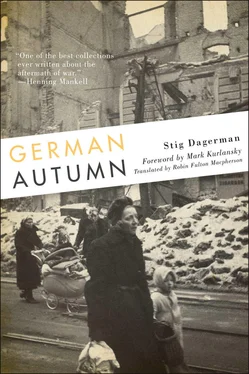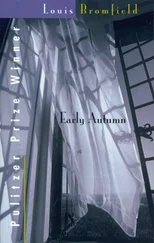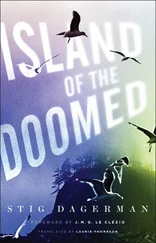In fact Dagerman was a very effective journalist of the kind he wanted to be. When the Swedish newspaper Expressen asked him to go to Germany in the autumn of 1946 and write articles about what he saw there, he was by no means unqualified for the task: he knew the language (his first wife was German) and he had already had some journalistic and editorial experience on various papers and journals of the time (notably the Syndicalist Arbetaren ). He may well have had deeper motives for seeking out people in extreme situations. We cannot tell how explicit these may have been, but I think it is mistaken to see German Autumn as marginal to his more ‘literary’ productions: the book touches on some of his basic concerns, and the process of writing it could well have proved a useful exercise in observation and realistic description.
The articles were duly written and published, and were made into a book the following year. Undoubtedly this helped to further Dagerman’s already growing reputation. It attracted, and still deserves, attention partly because he had a sharp eye for concrete details, partly because he could argue pungently, but mainly because he dared to see German individuals as suffering human beings rather than simply as tokens of national disgrace or guilt.
And it was this that brought him into conflict with the kind of journalism he often found practised by so many Allied reporters and other foreign investigators. They may have called themselves ‘observers’ but to Dagerman they refused to use their eyes. ‘A French journalist of high repute begged me with the best of intentions and for the sake of objectivity to read German newspapers instead of looking at German dwellings or sniffing in German cooking-pots.’
At one level some of their responses simply irritated him. So many times it was said or written that the conditions in which countless Germans had to live were ‘indescribable’. That is nonsense, said Dagerman: ‘If one wants to describe them, they can be described quite perfectly.’ And he went on to describe them. On the political level he was sceptical of the Allies’ ability or will to help the Germans eradicate Nazism: he felt that Allied tactics ‘helped to make the soil for democracy more sterile rather than more favourable’. ‘Denazification’ he saw as a cynical farce which by and large eased the transition into civilian life for ex-Nazis, often at the expense of those they had previously oppressed. He derided those journalists who asked people who lived in waterlogged cellars if life had been better under Hitler and then affected horror when the answer was ‘Yes’. ‘If you ask someone starving on two slices of bread per day if he was better off when he was starving on five you will doubtless get the same answer.’
At a deeper level questions of guilt and suffering gnaw at Dagerman throughout the journey. His greatest contempt is for the naive and cruel notion that the German people as a whole ‘deserve’ their suffering. He responds not with abstract arguments but by looking at the lives of the people he meets. Does deserved suffering feel any different from undeserved suffering? What happens to people who are permanently hungry? ‘For hunger is a form of unaccountability, not just a physical but also a mental state that leaves minimum space for the leisure of thought. This meant that one naturally heard things which sounded most unattractive but which, nevertheless, in the given situation, gave one no right to make cocksure prognoses.’
From the ex-Nazi prosecutor who survives Year Zero with plenty of firewood and whose children eat real butter, and the writer-aesthete who withdraws into history, there is an extraordinary range of individual fates. To those who were suffering Dagerman allows a degree of respect, a kind of prerogative, that qualifies whatever judgements he may be inclined to make. He never forgets that the comparative luxury of the Press hotel (’No German Civilians’) is waiting for him. And when he leaves, he is well aware of the privileged nature of his voluntary expedition into the landscapes of ruin and want. One question, he tells us, weighed on him more than any other: ‘What would it be like to have to stay behind, to have to be hungry every day, to have to sleep in a cellar, to fight at every moment against the temptation to steal, to have to tremble with cold every minute, to have to survive, constantly, the most intractable conditions? I remember people I met who had to tolerate almost all of that.’
But the book does not end with such a neat gesture. Dagerman leaves us in his last chapter with a gallery of individual experiences, true stories of how people he met responded to the process of survival and recovery — a gallery of enigmas, we could say, as if Dagerman were defying us to think of easy conclusions about whether this or that person was simply right or simply wrong. It is not by accident that the last person mentioned is a camp-survivor who sees no point in trying to tell his story.
In the autumn of 1946 the leaves were falling in Germany for the third time since Churchill’s famous speech about the falling of leaves. It was a gloomy season with rain, cold — and hunger, especially in the Ruhr and generally throughout the rest of the old Third Reich. All autumn, trains arrived in the Western Zones with refugees from the Eastern Zone. Ragged, starving and unwelcome, they crowded in dark, stinking station-bunkers or in the giant windowless bunkers that look like rectangular gasometers, looming like huge monuments to defeat in Germany’s collapsed cities. The silence and passive submission of these apparently insignificant people gave a sense of dark bitterness to that German autumn. They became significant just because they came and never stopped coming and because they came in such numbers. They became significant perhaps not in spite of their silence but because of it, for nothing can be expressed with such a charge of menace as that which is not expressed. Their presence was both hateful and welcome — hateful because they arrived bringing with them nothing but their hunger and their thirst, welcome because it fed suspicions which one would willingly entertain, distrust which one would willingly cultivate, and despair by which one would willingly be possessed.
And can anyone who actually experienced that German autumn say that this distrust was not justified or that this despair was unmotivated? It can well be said that these never-thinning streams of refugees that flowed across the German lowlands from the lower Rhine and the lower Elbe as far as the windy highlands around Munich were one of the most important factors in the internal affairs of this country without internal affairs. Another factor of domestic policy, and of about the same significance, was the rain that lay two feet deep in the populated cellars of the Ruhr district.
Someone wakens, if she has slept at all, freezing in a bed without blankets, and wades over the ankles in cold water to the stove and tries to coax some fire out of some sour branches from a bombed tree. Somewhere in the water behind, tuberculous children are hoarsely coughing. If she does succeed in getting a few flames going in the stove — a stove which at the risk of her life she has heaved out of a crumbling ruin which its owner has lain buried several yards beneath for the past two years — the smoke billows into the cellar and those who are already coughing cough even more. On the stove there is a pan of water (there is no lack of water) and she stoops and gropes in the water on the floor and plucks up some potatoes that have been lying invisible beneath the surface. The woman standing ankle-deep in cold water puts these potatoes in the pan and waits for them until, in due course, they are edible, although they were already frozen when she managed to get hold of them.
Читать дальше












